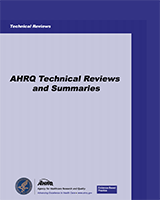NCBI Bookshelf. A service of the National Library of Medicine, National Institutes of Health.
Structured Abstract
Objective:
The objective was to identify and summarize evidence from controlled trials on the efficacy and tolerability of self-administered drug treatments for acute migraine headache.
Search Strategy:
A strategy combining the MeSH term “headache” (exploded) and a previously published strategy for identifying randomized controlled trials was used on the January 1966 to December 1996 MEDLINE database. Other computerized bibliographic databases, textbooks, and experts were also utilized.
Selection Criteria:
English-language controlled trials involving patients with acute migraine headache in which at least one treatment offered was a self-administered drug treatment were included.
Data Collection and Analysis:
The number of patients obtaining headache relief according to an a priori definition of at least a 50% reduction in pain severity was recorded and used to calculate odds ratios for headache relief Measures of pain severity reported as group means (and standard deviations) were used to calculate standardized mean differences (or effect sizes). Where similar trials provided data, meta-analysis of efficacy measures was performed. The identity and rates of adverse events were recorded and statistically compared.
Main Results:
Placebo-controlled trials support the efficacy of a number of self-administered treatments for acute migraine, including non-steroidal anti-inflammatory drugs (NSAIDs), dihydroergotamine (DHE) nasal spray, sumatriptan (in subcutaneous, oral, and intranasal formulations), and opiate analgesics (codeine and butorphanol). Evidence supporting the efficacy of ergot alkaloids and isometheptene compounds is weaker. Comparisons among alternative drug treatments are few in number and mostly inconclusive. Controlled trials of antinauseants or caffeine used in conjunction with ergots or NSAIDs do not show a significant adjuvant effect on pain relief. Ergotamine tartrate was associated with the highest rate of adverse events, principally nausea, but concomitant administration of antinauseants or caffeine appear to improve its tolerability.
Conclusions:
Several self-administered drugs appear to be effective for the treatment of acute migraine. The inconclusive comparisons among classes of drugs and individual agents suggest that the choice among alternatives for the treatment of acute migraine may, for the present, depend more on side effects and contraindications than on data about efficacy.
Contents
- Executive Summary
- Evidence Summary
- BACKGROUND
- OBJECTIVES AND ORGANIZATION OF THE REPORT
- METHODOLOGY
- NSAIDs AND OTHER NON-OPIATE ANALGESICS
- ERGOT ALKALOIDS
- DIHYDROERGOTAMINE (DHE) NASAL SPRAY
- SUBCUTANEOUS SUMATRIPTAN
- ORAL SUMATRIPTAN
- INTRANASAL SUMATRIPTAN
- NEW 5HT1D- RECEPTOR AGONISTS
- OPIATE ANALGESICS
- ISOMETHEPTENE AND MIDRIN®/MIDRID®
- DOMPERIDONE TAKEN DURING THE MIGRAINE PRODROME
- DISCUSSION AND CONCLUSION
- FUTURE RESEARCH NEEDS
- References
- Evidence Tables
- Appendix A MEDLINE search strategy
- Appendix B Data collection form
Project Directors: Douglas C McCrory, MD, MHSc, David B Matchar, MD. Project Manager: Rebecca N Gray, DPhil. Research Assistants: Louise Nobles, RN, Susan Farese, RN, Pramod Gumpeni. Technical Advisors: Jay Rosenberg, MD, Stephen Silberstein, MD, Seymour Solomon, MD, William Young, MD, James Adelman, MD, David Buchholz, MD, David Capobianco, MD, Debra Elliott, MD, David Kudrow, MD, Ninan Mathew, MD, Lawrence Newman, MD, Nabih Ramadan, MD, Carl Sadowsky, MD, Elliott Schulman, MD, Stewart Tepper, MD, Paul Winner, MD. AHCPR Project Officer: Ernestine Murray, RN, MAS.
Prepared for: Agency for Health Care Policy and Research, Department of Health and Human Services, U.S. Public Health Service, Rockville, Maryland. Contract No. 290-94-2025. Prepared by: Center for Clinical Health Policy Research, Duke University.
Suggested citation:
Duke University, Center for Clinical Health Policy Research. Self-Administered Drug Treatments for Acute Migraine Headache. Technical Review 2.4. February 1999. (Prepared for the Agency for Health Care Policy and Research under Contract No. 290-94-2025. Available from the National Technical Information Service; NTIS Accession No. PB99-127854.)
This document does not necessarily represent the views of the Department of Health and Human Services. It is available from the National Technical Information Service at 1-800-553-6847.
- NLM CatalogRelated NLM Catalog Entries
- Review Parenteral Drug Treatments for Acute Migraine Headache[ 1999]Review Parenteral Drug Treatments for Acute Migraine HeadacheGray RN, McCrory DC, Eberlein K, Westman EC, Hasselblad V. 1999 Feb
- Review Drug Treatments for the Prevention of Migraine Headache[ 1999]Review Drug Treatments for the Prevention of Migraine HeadacheGray RN, Goslin RE, McCrory DC, Eberlein K, Tulsky J, Hasselblad V. 1999 Feb
- Review Behavioral and Physical Treatments for Migraine Headache[ 1999]Review Behavioral and Physical Treatments for Migraine HeadacheGoslin RE, Gray RN, McCrory DC, Penzien D, Rains J, Hasselblad V. 1999 Feb
- Acute treatment of migraine attacks: efficacy and safety of a nonsteroidal anti-inflammatory drug, diclofenac-potassium, in comparison to oral sumatriptan and placebo. The Diclofenac-K/Sumatriptan Migraine Study Group.[Cephalalgia. 1999]Acute treatment of migraine attacks: efficacy and safety of a nonsteroidal anti-inflammatory drug, diclofenac-potassium, in comparison to oral sumatriptan and placebo. The Diclofenac-K/Sumatriptan Migraine Study Group.. Cephalalgia. 1999 May; 19(4):232-40.
- Review Sumatriptan: a selective 5-hydroxytryptamine receptor agonist for the acute treatment of migraine.[Ann Pharmacother. 1992]Review Sumatriptan: a selective 5-hydroxytryptamine receptor agonist for the acute treatment of migraine.Fullerton T, Gengo FM. Ann Pharmacother. 1992 Jun; 26(6):800-8.
- Self-Administered Drug Treatments for Acute Migraine HeadacheSelf-Administered Drug Treatments for Acute Migraine Headache
Your browsing activity is empty.
Activity recording is turned off.
See more...
